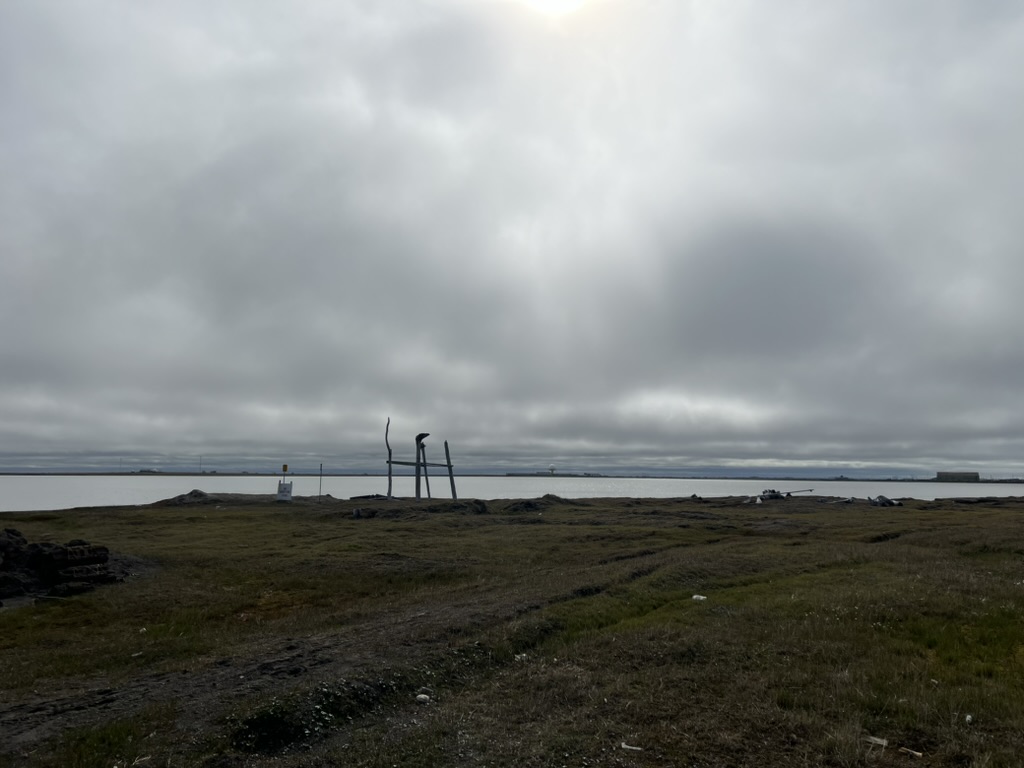
Haluuġivsi from Utqiaġvik, Alaska, the northern-most city in the United States. My whirlwind polar adventure is coming to an end. After a very short 10 days (ALL DAY as the sun has not set in Alaska since mid-May), I find myself spending my last few hours in town reflecting on my experience both with the people as well as the research I helped with, all while admiring the tundra.
Utqiaġvik refers to a place to gather wild roots in the Iñupiaq name. The Iñupiat people of the North Slope of Alaska (Northside of the Brooks Range) have lived in and around Utqiaġvik since about 500 AD, descendants of the Thule culture. Utqiaġvik is a modern American city with running water, WIFI, and delicious locally owned restaurants, yet the citizens of Utqiaġvik deeply honor and continue to follow their Iñupiat culture by upholding their values and adhering to a subsistence lifestyle.
The Iñupiat are subsistence hunter/fishermen, deeply relying on fish and Agviq (Bowhead Whale Balaena mysticetus) during the spring and fall migrations. Each value is exemplified during the hunt:

– Piqpakkutiqaġniq suli Qiksiksrautiqaġniq Utuqqanaanun Allanullu (Love and Respect for Our Elders and for One Another): There is a deep appreciation for elder knowledge, and Iñupiat elders are cared for by providing them with food from the harvested animals.
– Qiksiksrautiqaġniq Iñuuaniaġvigmun (Respect for Nature): Harvested animals are honored by providing them with a swift and humane release, so that their spirit can return to the sea and share with other whales about how well it was treated and convince others to give themselves to the hunters.
– Iļagiigñiq (Knowledge of Family Kinship and Roles): Everyone in the family has a role to fulfill during the hunt. Although it is changing, traditionally, the men would go on the hunt, and the women would bring them food, as it was believed that any cooking at the hunting camps would scare the whales away as the whales could smell the food. This is changing and there are women captains and cooking occurs on at the camps.
– Aviktuaqatigiigñiq (Sharing): Meat from successful hunts is shared throughout the village, ensuring everyone has access to the necessary nutrients to survive in the harsh climate.
– Iñupiuraallaniq (Knowledge of Language): Iñupiat was banned between the 17th-20th century, but many are working to relearn their stolen language. For the most part, harvested animals are identified using the Iñupiat name, passing down this vital portion of their culture with younger generations, and non-indigenous people in town.
– Paammaağigñiq (Cooperation): It is HARD work to land a harvested whale. People must work together to bring the whale to shore and haul the up to 100-ton animal on to land.
– Quvianġuniq (Having a Sense of Humor): Laughing about missed opportunities during the hunt is vital to get through the arduous task.
– Aŋuniallaniq (Knowledge of Hunting Traditions): Sharing traditions and information of previous successful hunts can lead to another successful year. It’s not only hunting locations, but also traditions like paddling quietly or not wearing red to not spook the whale.
– Nagliktuutiqaġniq (Compassion): Compassionate harvesting includes humane manners of taking the animal, without causing needless pain or stress on the animal.
– Qiñuiññiq (Humility): Young whalers are taught to not boast about their skills as this can be heard by the whales, causing the animal to avoid that whaling crew. Humility goes hand in hand with several values including Qiksiksrautiqaġniq Iñuuaniaġvigmun and Aŋuniallaniq.
– Paaqłaktautaiññiq (Avoidance of Conflict): Avoiding conflict occurs not by running away from conflict, but from treating each other with respect, thus not creating unnecessary havoc.
– Ukpiqqutiqaġniq (Spirituality): Finally, respecting the spirit of the whale demonstrates to other whales that they are cared for and makes them more willing to give themselves to the hunting party in the future.
The Iñupiat of the North Slope are one of the many cultures in Alaska. A portion of our work with Polar STEAM is collaborating with the Effie Kokrine Charter School in Fairbanks, about 500 miles south of Utqiaġvik. The Dena’ina people of the Tanana live in this area and share a rhythm of life with the seasons in the forest and rivers of interior Alaska. Students at Effie Kokrine are taught to live by values of Alaska Native culture by elders including:
-Respect for Elders – Respect for Nature – Respect for Others -Sharing – Love for Children
-Providing for Family – Wisdom – Spirituality – Responsibility – Unity
-Compassion – Love – Dignity – Honoring the Ancestors – Honesty
-Humility – Humor – Knowledge of Language – Caring
-Cooperation – Endurance – Hard Work – Self-Sufficiency – Peace
These values will be placed front and center in the educational material we are developing in collaboration with educators at Effie Kokrine and with Ukpeaġvik Iñupiat Corporation (UIC). Indigenous stories, traditional foods, and the annual seasonal cycle will direct lessons on biology and science that meet state mandated learning standards.




